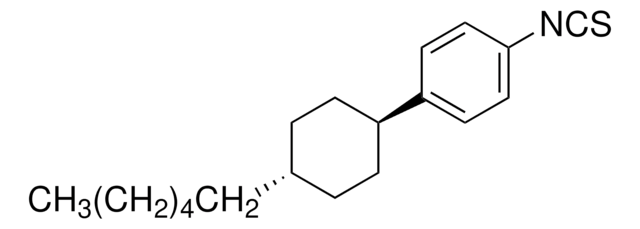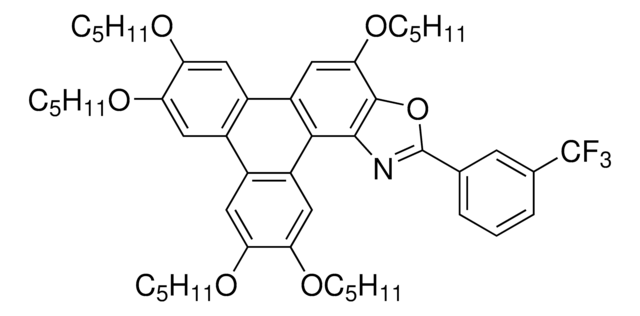About This Item
Recommended Products
description
Polymorph crystalline phase: Solid, Discotic Liquid Crystal, Isotropic
Quality Level
solubility
soluble (DCM,THF > 1 mg /mL, MeCN, DMSO < 1 mg /mL)
λmax
270 nm in ethyl acetate
εmax
86,000 M-1cm-1 in ethyl acetate
fluorescence
λem 457 nm, quantum yield 0.43 (pSS(nm) = 187; Fluorescence lifetime (ns) = 4.23)
storage temp.
2-8°C
Related Categories
General description
Application
- Metal cation sensing
- Fluorescent dye staining
- Organic semiconductor for organic electronic and photonic applications
- Multi-photon microscopy
Storage Class Code
11 - Combustible Solids
WGK
WGK 3
Flash Point(F)
Not applicable
Flash Point(C)
Not applicable
Choose from one of the most recent versions:
Certificates of Analysis (COA)
Don't see the Right Version?
If you require a particular version, you can look up a specific certificate by the Lot or Batch number.
Already Own This Product?
Find documentation for the products that you have recently purchased in the Document Library.
Articles
Triphenoxazoles exhibit tunable properties, liquid crystallinity, and potential for modification.
Triphenoxazoles exhibit tunable properties, liquid crystallinity, and potential for modification.
Triphenoxazoles exhibit tunable properties, liquid crystallinity, and potential for modification.
Triphenoxazoles exhibit tunable properties, liquid crystallinity, and potential for modification.
Our team of scientists has experience in all areas of research including Life Science, Material Science, Chemical Synthesis, Chromatography, Analytical and many others.
Contact Technical Service



![6-[4-(4-Cyanophenyl)phenoxy]hexyl methacrylate 96%](/deepweb/assets/sigmaaldrich/product/structures/225/164/3dc33b5e-baf4-44f2-9e81-770c92250f7b/640/3dc33b5e-baf4-44f2-9e81-770c92250f7b.png)




